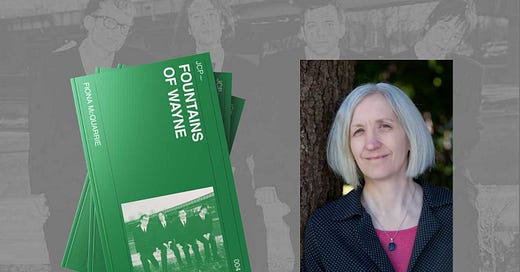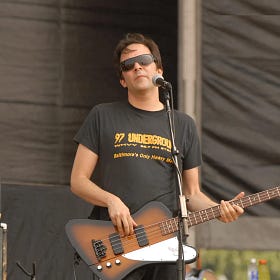A new biography from J-Card Press makes it crystal clear that there was a lot more to Fountains of Wayne than “Stacy’s Mom.”
“Adam (Schlesinger) and Chris (Collingwood) both produced so many excellent songs. Even if they threw out hundreds of unfinished songs to get to those great ones, the consistently high standard of their songwriting is truly remarkable,” Fountains of Wayne author Fiona McQuarrie told me for the interview below.
“And to have two songwriters that good in the same band, and to have both of them writing for that band, is a real gift.”
I was sent a copy of the book to provide a blurb and tore through it.
Although the band members weren’t available to be interviewed, McQuarrie does an impressive job of covering the details of their career. The chronological account starts with the paths that led to the legendary Collingwood/Schlesinger songwriting partnership, the addition of guitarist Jody Porter and drummer Brian Young, career peaks and valleys, the breadth and depth of their catalog, and FoW’s lasting legacy.
Here’s what I had to say after reading Fountains of Wayne:
"Most people know Fountains of Wayne for 'Stacy's Mom,' but McQuarrie's well-researched retrospective spotlights an impressive catalog packed with countless other should-have-been hits. Fans will want to set aside a few hours to devour this short book in one sitting. I definitely did."
This is a must read for Fountains of Wayne fans, and power pop lovers at large.
Fiona McQuarrie Interview
Congrats on a great read! What inspired you to write about Fountains of Wayne?
Fiona McQuarrie: Thank you!
Jeff Gomez of J-Card Press had the idea for the book. He contacted me when he was launching the company, and after explaining his plans, he sent me a list of potential subjects for J-Card books (“short biographies of the best alternative, indie rock, hip-hop, and riot grrrl groups of the past twenty to thirty years,” as it says on the J-Card website). The name that jumped out at me from that list was Fountains of Wayne. I really enjoyed their music back in the day, but I didn’t know a lot about them. I was interested in finding out how they did what they did.
Is it true that this is FoW's “first full-length biography?” Why do you think there are no previous books on this band?
Fiona McQuarrie: As far as I can tell, it is true! There’s a lot of music books being published right now, which is great—it shows that people are interested in reading about music as well as listening to it. But publishers seem to prefer autobiographies, overviews of genres or eras, and books about hugely successful bands. A biography of FoW doesn’t fit into any of those categories. If anyone had previously tried to pitch a FoW biography, there might not have been any publishers who saw that as a viable project.
I thought this book was really well written and researched. What was your approach to covering the band's entire career?
Fiona McQuarrie: I played around with a couple of different narrative structures. I decided to tell the story chronologically because that seemed the best way to explore how FoW’s work evolved and grew across time. I started off with a binder that I filled with least one looseleaf page for each year from 1967 (when Chris Collingwood and Adam Schlesinger were born) to 2024. Then as I went through my sources, I wrote down every event that I found on the page for the year when it happened. Those yearly pages became the basis for the book.
Were there any specific challenges along the way?
Fiona McQuarrie: There were a couple. One was that the band members, especially Adam, had a lot of projects outside FoW. Even though some of those projects were fascinating, I had to be strict in keeping the focus of the narrative on FoW. Generally I didn’t go into too much detail on outside projects unless they happened while FoW was on a break, or unless they related to something that FoW did.
Another was that Chris, Jody Porter, and Brian Young were not available to be interviewed. I’m absolutely fine with that. Obviously there are things I would have liked to ask them, but I also understand that not everyone wants to be defined by or known for something they did earlier in their lives. And as it turned out, they were probably busy working on something else (see the next paragraph). So I had to be mindful that I was telling their story as an observer.
And finally, the week that the book was going to the printers, FoW announced two live shows for this summer! I wrote the book on the reasonable assumption that with no albums since 2011 and no live performances since 2020, and with Adam passing away, FoW’s career had ended. Thankfully, there was enough time after the announcement to pull the manuscript so that I could rewrite it, on a very tight timeline. That was quite a week.
Did you learn anything about the two main songwriters—Collingwood and Schlesinger—that surprised you?
Fiona McQuarrie: Not so much surprised, but I discovered things that gave me even greater respect for them. One example is, I read a lot of newspaper and magazine interviews with Adam. Even when he was obviously answering a question that he’d been asked before, he gave his answer a slightly different spin every time, so that the writer had something unique for their story. Having done those kinds of interviews myself, I know how rare that is, and how grateful you are as a writer when it happens. He was very clever at publicity, and was also a very smart businessperson.
Also, Adam and Chris were the main spokesmen for the band. The publicity part of being a successful musician is a whole other layer of work that tends to be overlooked in band biographies. It’s not just touring and playing shows—it’s the meet-and-greets with the local media, the radio station appearances, the “phoner” interviews, the TV interviews, the in-person appearances at record stores (when there were a lot more record stores than there are now), the industry conventions and showcases, and so on. A lot of those tasks fell to Adam and Chris. And the band toured a lot. I listed concert dates on the yearly pages I kept, and I got exhausted just writing them all down.
FoW are best known for "Stacy's Mom." Do you think that song is a good representation of the band, an outlier, or...?
Fiona McQuarrie: It’s a bit of all of those. I think it’s an incredibly well-written and well-arranged song, so in that sense it’s representative of the quality of FoW’s work. The subject matter is less substantial than other FoW songs, but for me the music and the performance balance that out. I know some people see it as a novelty song about a MILF, and they prefer other FoW songs with more lyrical depth. That’s fair enough. But it also did a lot for the band, because it brought FoW to the attention of listeners who might not have heard of them otherwise. For me, “Stacy’s Mom” was the gateway song that got me into the rest of FoW’s music.
It’s also their only US hit single, so that makes it an outlier. Chris has described it as more of a hit video than a hit song, and that’s fair enough too, because there’s no doubt that the video was one of the reasons the song was a hit. For what it’s worth, I think the video is brilliant.
What are a few of your other favorite FoW songs?
Fiona McQuarrie:
“Supercollider”
I love the mood of it. For me it also evokes a really happy day I spent on a day trip up the Hudson Valley, north of New York City. It just feels like that day felt.
“Red Dragon Tattoo”
This song, and the band’s performance of it, is as close to perfect as a song ever gets. The narrator is so real, with all his doubts and bravado, and the melody is so catchy.
“Bright Future in Sales”
I know the guy in this song, because I went to university with guys exactly like this. They were convinced they were going to be great businessmen and acted how they thought great businessmen acted, but in reality they were completely incompetent and kept having to cover that up. Also, the first time I visited New York City I actually saw a guy in a business suit sleeping next to a planter at the Port Authority bus station. I was thoroughly impressed.
“Cold Comfort Flowers”
Chris has said that he put together a “bunch of notes” to write this song. I absolutely love how he ties these random images together and creates this feeling of wistfulness and sadness. I have no idea what this song is about, and that’s why I like it so much.
What's your all-time favorite FoW album?
Fiona McQuarrie: It would have to be Welcome Interstate Managers, because it has so many great songs, and the musicianship is just outstanding. A very close second would be Utopia Parkway, which is great in a different way—it’s a little more thematically unified than Welcome Interstate Managers.
While writing the book I listened to Utopia Parkway more than I had in the past, and now I appreciate it more than I used to. But that being said, there’s something to recommend about every single one of FoW’s albums, and there’s not too many acts whose albums have that level of consistency.
What's next for you?
Fiona McQuarrie: Right now, I’m working on a completely different book, a textbook related to my professional field. After that’s done, I may be burnt out on book writing for a while. But the opportunity to do the FoW book came to me, rather than me coming up with the idea for the book. So if a similar book-writing opportunity came my way, I would certainly give it some serious consideration.
More Writing About Fountains Of Wayne
'Power Pop For Slackers'
Adam Schlesinger, a talented musician and accomplished songwriter, sadly died April 1, 2020.
Song-X-Song: 'Welcome Interstate Managers'
I’m fascinated by Fountains of Wayne’s flawed masterpiece, Welcome Interstate Managers. To my ears it’s a reluctant Gen X concept album on par with career-defining works like Wilco’s Yankee Hotel Foxtrot and Radiohead’s OK Computer. But it’s also the album that unleashed “Stacy’s Mom,” forever making them one-hit-wonders.









Definitely need to pick this up. "Cemetery Guns" is such a gem on Sky Full of Holes, which tends to be underrated.
Fire Island is a beautiful little ballad; not saying it’s my favorite, but it sprung to mind when I reached back there for a deep cut. Prom theme is of a similar cloth.